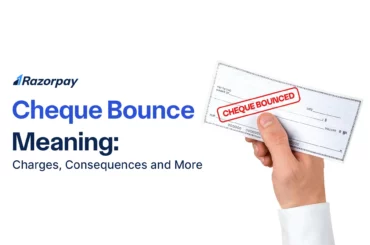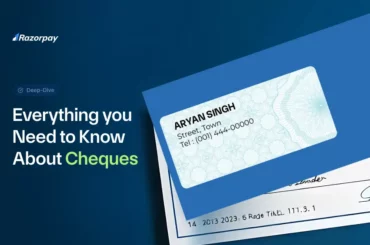Table of Contents
Bearer Cheque vs Order Cheque: Key Differences
|
Factor |
Order Cheque |
Bearer Cheque |
|
Definition |
Payable to a designated individual or organisation specified on the cheque. |
Payable to the person who holds and presents the cheque at the bank. |
|
Endorsement |
Required to transfer the cheque to another person. |
Not required; the holder can cash it without endorsement. |
|
Security |
Higher security, as it requires identification of the payee. |
Lower security since anyone holding the cheque can cash it. |
|
Risk of Loss/Theft |
Lower risk due to the need for identification. |
Higher risk as it can be cashed by anyone who finds it. |
|
Transferability |
It can be transferred through proper endorsement. |
It can be transferred through simple delivery. |
|
Common Use Cases |
Used for transactions where security is a priority, such as business payments. |
Used for quick and convenient transactions, like petty cash payments. |
|
Filing Requirement |
Requires proper documentation and filing for record-keeping. |
Minimal filing requirements due to its simplicity. |
|
Bank Procedures |
The bank verifies the identity of the payee before processing. |
The bank processes the cheque without verifying the identity of the holder. |
|
Marking |
Marked with “Order” or the word “Bearer” is struck out. |
Marked with “Bearer” or no specific marking if it is a bearer cheque. |
|
Payment Limitations |
No specific limitations, however, are subject to bank policies. |
No specific limitations, however, are subject to bank policies. |
|
Liability |
The bank is liable if payment is made to the wrong person due to improper verification. |
The bank is not liable if payment is made to the wrong person. |
|
Regulatory Compliance |
Must comply with stricter regulatory requirements due to higher security. |
Complies with basic regulatory requirements. |
What is a Bearer Cheque?
A bearer cheque is payable to whoever has it in their possession rather than to a designated person or entity. This allows anyone holding the cheque to cash or deposit it without showing ID or providing a signature. Bearer cheques offer simplicity and convenience for quick transactions, enabling immediate access to funds and easy transferability. However, they carry certain risks, such as loss or theft, since anyone with a cheque can withdraw the money.
Main Features of Bearer Cheques
-
Bearer cheques stand out because they don’t specify a particular payee. Instead, they can be cashed by anyone who presents the cheque at the bank.
-
A notable feature of bearer cheques is that they do not require the holder to present any form of ID or endorsement.
-
These cheques enable immediate cash withdrawal when presented at the bank. This feature is especially beneficial in scenarios requiring quick liquidity, as there are no delays linked to verifying the payee’s identity.
-
These cheques can be smoothly transferred between individuals merely by handing them over. This makes bearer cheques akin to cash in terms of convenience.
-
Because bearer cheques do not require identification and can be easily transferred, they pose a considerable risk if lost or stolen. Anyone who finds the cheque can cash it, resulting in potential financial loss for the original owner.
Benefits of Using a Bearer Cheque
-
Collecting payments via bearer cheques at the counter is a simple process.
-
The absence of required approval for negotiation makes bearer cheques simple to manage.
-
It is beneficial for executing low-value transactions.
-
Those who do not hold a bank account can swiftly receive payments by cheque from the bank, as signature verification and certification are not required.
-
You can easily convert them into order cheques.
What is an Order Cheque?
An order cheque is a cheque that is made payable to a specific person or organisation. The payee must show identification to cash or deposit the cheque, adding an extra layer of security.
Key Features of Order Cheques
-
The payment is directed to a designated recipient.
-
The recipient needs to verify their identity before accessing the money.
-
Requiring ID makes the transaction a little slower.
-
This payment method is more secure than bearer cheques.
Benefits of Using Order Cheque
-
Payments are secure as banks cross-check information before processing the transaction.
-
It is suitable for high-value transactions due to its security and traceability.
-
It is non-transferable without a signature, making it easier to identify the parties involved.
Important Things to Consider When Choosing Between Bearer and Order Cheques
1. Security vs. Convenience:
When deciding between bearer and order cheques, consider whether you prioritise security or convenience. Bearer cheques allow anyone holding them to cash them quickly, but this ease raises fraud risks because of the lack of an identification requirement. In contrast, order cheques enhance security by requiring the named individual to present an ID, slightly complicating the transaction process.
2. Transaction Speed:
Bearer cheques facilitate quicker cashing since they don’t require identity verification, making them suitable for urgent fund access. Conversely, order cheques involve a verification process that can slow down transactions. While this adds security, it makes order cheques less efficient than bearer cheques.
3. Endorsement Requirements:
A bearer cheque can be cashed by anyone who holds it, without needing the payee’s signature or approval (endorsement). While this makes transactions quicker and more convenient, it also raises the risk of misuse. In contrast, order cheques require the payee’s endorsement for transfer, ensuring that only the intended recipient or their authorised representative can access the funds, thus offering greater security.
Legal Risks of Misusing Bearer and Order Cheques
Forgery
Forgery refers to manipulating or creating cheques to defraud others. In India, cheque forgery is considered a grave criminal offence, punishable under Section 467 of the Indian Penal Code (IPC). This encompasses altering cheque details such as the amount, date, or other critical information, as well as fabricating entirely false cheques.
Those found guilty of cheque forgery may face harsh penalties, including up to ten years of imprisonment and substantial fines. Moreover, offenders may also be charged under Section 468 of the IPC for forgery with fraudulent intent, which entails additional severe punishments.
Theft
Theft of cheques, whether bearer or order cheques, is a severe crime. Bearer cheques are especially susceptible to theft, as anyone possessing them can encash them without needing identification. Under Section 379 of the IPC, stealing a cheque and using it to withdraw money is a punishable offence, with penalties including imprisonment for up to three years, a fine, or both.
Although order cheques require the payee’s identification, they, too, can be stolen and misused. The legal consequences involve theft charges and may include additional penalties if the stolen cheque is used for fraudulent activities.
Fraud
Fraudulent actions involving cheques, such as impersonating someone to cash a cheque, are treated as serious crimes under Indian law. For example, suppose an individual pretends to be the legitimate owner of a cheque to withdraw funds. In that case, they can be prosecuted under Section 420 of the IPC for cheating and dishonestly inducing the transfer of property. This offence is punishable with imprisonment for up to seven years, along with a fine.
How Cheque Transactions Have Evolved Over Time
Decline of Bearer Cheques
Bearer cheques, which allow anyone in possession to cash them, have seen a notable drop in popularity due to security risks. Since these cheques do not require identification or endorsement from the holder, they are highly susceptible to theft and fraud. Over time, as both financial institutions and customers became increasingly aware of these vulnerabilities, the use of bearer cheques has significantly declined.
Rise of Order Cheques
On the other hand, order cheques have become more widely used because of their added security measures. Unlike bearer cheques, only the individual named on an order cheque can cash or deposit it, requiring their endorsement. This feature offers extra protection, making it more difficult for unauthorised individuals to misuse the cheque. The growing preference for order cheques aligns with the overall shift towards safer financial transactions.
Digital Transition
The surge in digital banking has greatly influenced how cheques are used today. Services like electronic cheque clearing and mobile cheque deposits have simplified the process, making it quicker and more convenient for customers. With these digital options, individuals can deposit cheques via their smartphones, eliminating the need for a trip to the bank. This shift towards digital solutions has enhanced efficiency while decreasing the dependence on physical cheques.
The Cheque Truncation System (CTS) introduced by the Reserve Bank of India (RBI) has revolutionised cheque processing in India. By removing the need to physically transport cheques, CTS allows electronic processing and clearance. This innovation has improved both the speed and security of cheque transactions, promoting a broader transition towards digital payment methods.
Conclusion
In summary, bearer cheques can be cashed by anyone holding them, offering convenience but posing higher risks due to the absence of identity checks. On the other hand, order cheques are issued to a specific individual, providing greater security by requiring identification. Over the years, cheque usage has shifted, with people and businesses choosing the type of cheque that aligns with their preferences for security and convenience. Although digital payments have revolutionised the financial world with quicker and safer transaction methods, order cheques and bearer cheques continue to play an essential role, particularly in situations where digital alternatives may not be practical.
Frequently Asked Questions (FAQs)
1. Who can convert the bearer cheque to an order cheque?
The issuer of a cheque has the option to change a bearer cheque into an order cheque. This is accomplished by crossing out the word “bearer” on the cheque and replacing it with “order.” This modification limits the payment to the specified payee, thereby increasing security.
2. Is a bearer cheque or an order cheque more secure?
An order cheque offers greater security compared to a bearer cheque. While anyone possessing a bearer cheque can cash it, an order cheque is only payable to the individual named on it or their authorised endorsee. This requirement for identification minimises the chances of misuse.
3. What is the validity of the bearer and order cheque in India?
In India, bearer cheques and order cheques remain valid for three months from the date of issuance. After this time frame, they are considered stale and cannot be encashed.


